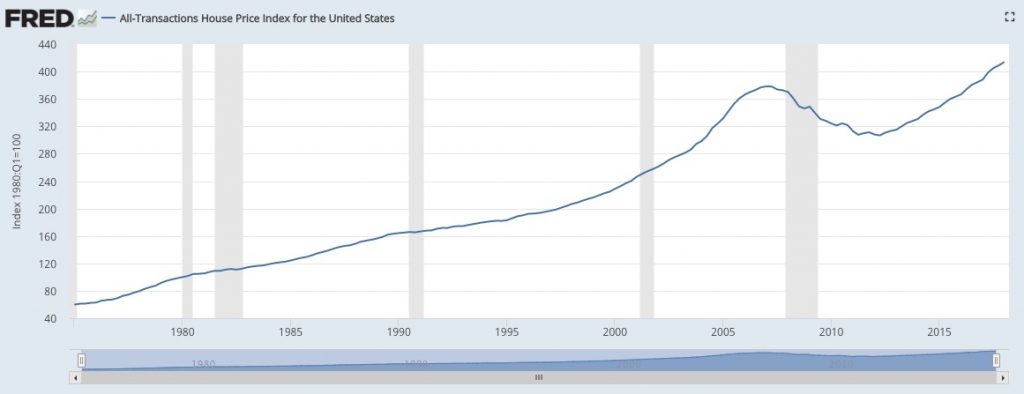The Best Way to Invest in Money-Making Real Estate—Without Draining Your Savings

One of the questions I’m asked about more and more frequently is rental real estate.
Everybody is interested in buying rental property. But in the back of my mind, all I can think about is the housing mania (and bust) that almost brought the entire financial system to a halt back in 2007-2008.
The next thing that crosses my mind is this chart of the National Home Price Index:

Source: FRED
As you can see, prices are higher now than they were prior to the housing crisis.
One thing I tell everyone is that buying rental property outright is not the only way for someone to get exposure to real estate. There are numerous ways for investors to get into real estate via the stock market. For example, investors can buy shares of REITs (Real Estate Investment Trusts). This gives an individual access to all kinds of properties—residential, office, industrial, apartments, hotels—without having to shell out hundreds of thousands of dollars.
To find out about REITs and what’s really going on the rental real estate market, I reached out to one of the leading real estate experts and co-founders of the Forbes Real Estate Council, John McKenna.
John is an expert in the real estate industry. He’s the co-founder and chief contributor of Today’s Real Estate Agent, a popular online training site and international referral network for both realtors and other business professionals.
Without further ado, here’s what John shared with me about the promising world of REITs:
Most people understand the idea of rental property. But what is a REIT (Real Estate Investment Trust)?
REITs were created by Congress in 1960 to give all individuals the opportunity to benefit from investing in income-producing real estate. REITs allow anyone to own or finance properties the same way they invest in other industries—through the purchase of stock. In the same way shareholders benefit by owning stocks in other corporations, the shareholders of a REIT earn a share of the income produced through real estate investment, without actually having to go out and buy or finance property.
Stock exchange-listed REITs provide the easiest and most efficient way to invest in real estate without subjecting investors to the liabilities of ownership and oversight burdens of property management. Investment in a REIT does not resemble real estate ownership as we know it. In fact, shares in a REIT have much more in common with stocks than with property in terms of risk and merit.
And here’s an added bonus: An investment in several different REITs is like gaining ownership interests in numerous different properties, all under different management.
How do they perform compared to the stock market and direct rental investment? If stocks crash, will REITs go down more than physical real estate?
Personally, I don’t believe we are going to see a stock market crash anytime soon. But just the same, it’s smart to minimize risk. You do that with REITs the same way you would with any other stock portfolio—by diversifying.
Let me also say this: With any sort of investing—whether it be physical real estate or equity REITs—you must continually keep you finger on the pulse of what’s going on around you. During the 2008 housing crisis, some investors got burned badly while others cashed on the short sale and rental market. That’s the name of the game. So stay aware and watch trends.
Real estate is cyclical, as is the stock market. The good news is, the two do not generally move in lock-step. That is, they are not directly correlated. That’s why it’s wise to have some investments in traditional stock, while others in different kinds of REITs. You want the diversification of investments that react differently at the same point in time. If one goes down, you want others going up.
However, successful investment in REITs is about more than watching tickers. My advice would be to really understand what’s impacting the REIT sector or the REITs you’re considering investing in—especially in your local market.
Does real estate (in the form of REITs) have more room to grow?
Yes, I think so. Personally, I don’t believe we are heading into a repeat of 2006-2007 (the housing boom). I do believe that we will see interest rates continue to rise and this will see a settling in home prices. Something like a price correction is likely to occur. But that’s not going to ruin growth potential.
It’s important to note, too, that there are a lot of other factors that will impact the market. For example, the cost of living is getting higher, gas prices are skyrocketing, credit card debt is increasing with repayments slipping, and tax benefits are being eroded quickly. These affect real estate investments directly, so it’s important to monitor them. You have to keep your finger on the pulse of what’s going on—always!
What about direct rental property investing? National home prices are higher than they were prior to the housing crisis, so is it a good time buy direct rental property?
Yes! But again, real estate is local, so you need to analyze your local market. Where I live in the Triangle area in North Carolina, for example, rentals are flying. This is driven by a constant increase in the population within the area, which doesn’t seem to be slowing down.
Ask yourself: What’s going on in my market?
What is the income potential with a REIT vs. rental property?
Well, that’s a bit like comparing apples and oranges. And there’s more than just income potential to consider—there’s also dividend potential, the ability to use leverage (debt financing), equity building, liquidity, tax efficiency, diversification, etc. So I’d look at both as good income potential. My preferred strategy is investing in a combination of the two.
Tell me about the liquidity advantage with REITs. What does that mean?
Immediate liquidity is perhaps the single greatest advantage of shared ownership in a REIT. Like any other stock, your shares in a REIT can be sold through your brokerage account at a market-clearing price at relatively low cost. Compare this to selling real estate that you own directly—it takes more time to sell (even on cash transactions) and there are much higher transaction costs involved. In other words, with an REIT there is no waiting while your house sits on the market for months.
What is the investment minimum for REITs?
You can buy a REIT share for $10 or less. Typically, it takes much more capital to own properties directly. Having said that, I’ve “controlled” properties for as little as $5 (option consideration on a lease option) and made a lot of money. Nonetheless, REITs are a great way to get started, especially if you are looking to dabble a little bit with real estate investing.
Okay, so what are the risks of direct rental investment vs. investing in a REIT?
There are many, many risks that go along with buying rental properties. Many take the form of the unknown—legal compliance issues you didn’t know about or due diligence you hadn’t considered. Then there are all the headaches that come with tenants, repairs, and maintenance. The smart thing is to delegate all these tasks to a property management company. But that can be costly.
There are also different risks associated with different kinds of properties—single-family homes, double blocks/duplexes, or apartment buildings. For example: If you own a single-family home, once your tenant moves out and you have to get the property ready for new tenants, your income is zero. But your expenses continue to accrue, even when the property is unoccupied. At least with an apartment building, if one unit is vacant, you can bring in income on the other occupied units.
You don’t have any of these risks with REITs. You have a different set of risks (interest rates, for instance), but the main risk is choosing the wrong REIT. My advice is to stay within the publicly-traded REITs and stay away from private REITs so as to greatly minimize your risk.
If someone is keen on buying property outright, is it better to invest in residential property, offices, hotels, or apartments?
It comes down to the local market. What’s going on in your local market and how does that impact each of these options? Plus, you need to ask yourself what your strengths are. Do you understand commercial real estate? Do you understand and are you comfortable with CAP rates and triple net leases, etc.? If not, then perhaps residential and apartments are more appropriate for you.
How can investors learn more about real estate investing?
For REITs, you really want to read a trusted investment publication and keep your ear to the ground for recommendations on REITs—but make sure the reasoning given is solid.
For real estate investing (rentals, etc.), you really want to have a strong, seasoned real estate agent on your team —one who focuses on working with real estate investors, knows investing, and knows the local market inside and out – is essential. Sites like SellYourHome.com are a great resource to learn about the whole process of selling your home. They need to know about upcoming developments, city ordinances and bylaws, what companies are likely to move in nearby, etc. Big corporations do their homework and know that a particular area is about to experience growth; this is a great sign for an investor.
I would also join a local real estate investment association.
#
Want to learn more about REITs and investment from John? You can find him on LinkedIn.
Set up the right routine for financial success, whatever your investment. It starts with a fine-tuned morning…
Sign up now to get our FREE Morning Routine guide—the #1 way to increase productivity, energy, and focus for profitable days. Used by thousands of fitness, business, and finance industry leaders to leapfrog the competition while making time for the people who really matter. Learn more here.
